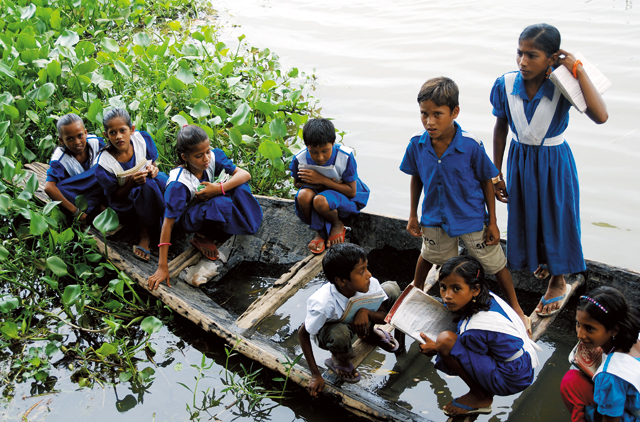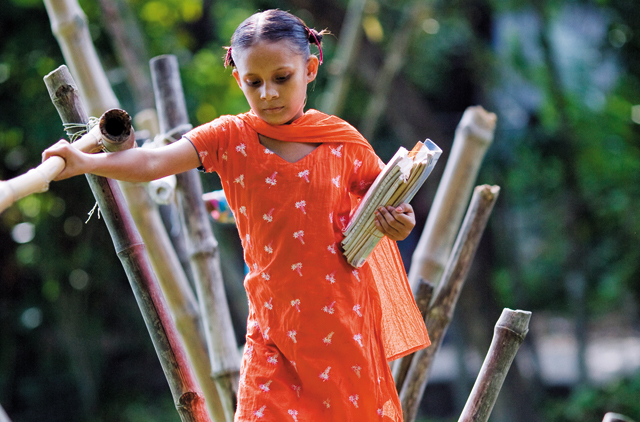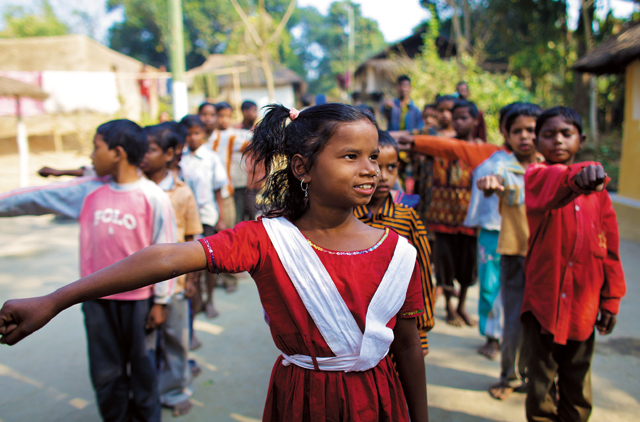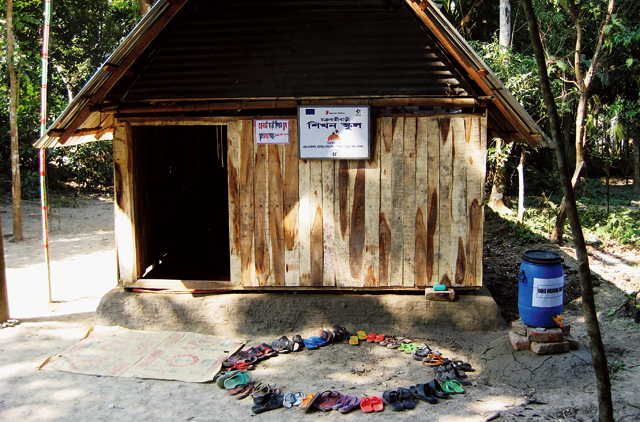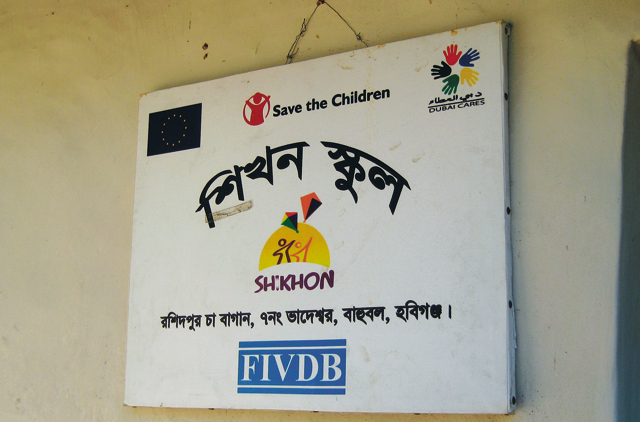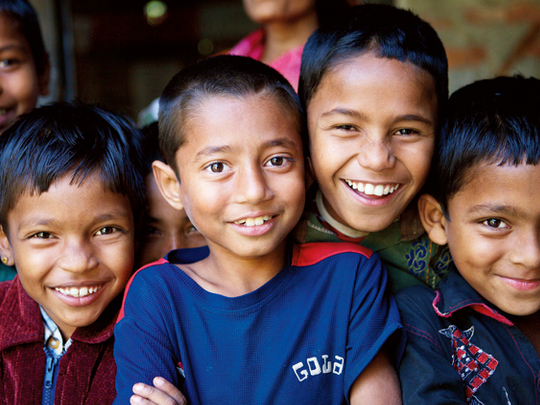
Before heading to school every morning, Josna, 11, pumps water to wash dishes in the house she lives in with her grandmother. She has to walk to school as there are no school buses in her village, Palashpur, in Matiranga district of Bangladesh. But Josna doesn't mind the trek, which involves crossing bamboo bridges spanning treacherous rivers. Why? Because her life before she started school was much more difficult: She used to work as a househelp, and also as a labourer building and repairing roads in her village.
Today, as she skips along to school after finishing her household chores, the past seems hazy and the future bright for both her and her family. She is one of many thousands of children learning in an informal Shikhon school supported by Save the Children (STC), an independent US-based organisation trying to bring about a change in the lives of children in need around the world.
‘Shikhon which means ‘learning' in Bengali, the national language of Bangladesh, is a non-formal primary education programme that reaches children in remote areas of Bangladesh - children who otherwise would not have had primary education. Many like Josna, come from very poor families whose parents are illiterate.
The Shikhon programme was designed by STC with support from several donors, including the European Commission. In 2008, based on the success of the programme and the viability of expanding operations, Dubai Cares - the philanthropic organisation started by His Highness Shaikh Mohammad Bin Rashid Al Maktoum, Vice President and Prime Minister of the UAE and Ruler of Dubai - committed to increasing the programme by nearly 50 per cent.
With support from Dubai Cares, a goal was set to provide 50,000 out-of-school children in Bangladesh with cost-effective, quality non-formal education that would help them rapidly achieve competencies comparable to five years of formal primary school development.
Modern approach
"Using progressive teaching methods, this initiative was set up to target first-time learners and help them gain grade 5 level competencies in four years," says Yousuf Luiz Caires, a senior manager at Dubai Cares. "The programme also provided training to 3,000 teachers and 1,500 teaching assistants. It formed and nurtured 1,500 community partner organisations and it educated 150,000 parents or caregivers on child-development issues."
Shikon trains local community members to be primary school teachers and supports them with school supplies, textbooks and daily guides for each school subject from Grades 1 to 5.
"Children in these schools typically perform much better than their counterparts in government primary schools, where more than 50 per cent drop out before Grade 5 and most never achieve basic competencies in reading, writing and mathematics," says Talat Mahmud, programme director of Shikhon.
A Shikhon school day lasts for three and a half hours and is usually conducted in the morning. "The children are taught through various interactive and fun learning techniques," says Mahmud. "They also get to enjoy themselves, playing with their friends and other students in the school."
Shikhon has assisted many villages across Bangladesh to start such informal schools. The Rashidpur Tea Garden is one such area with limited educational opportunities, and was chosen as a project model. "The plantation has been operational since 1887 but for almost a decade the conditions of labourers have remained unchanged," says Mahmud.
The Garden authorities began a primary school on the premises for the workers' children; however, a large number of children on the estate either dropped out or did not even enrol. The nearest government-run primary school is more than two kilometres away.
"A typical day at the tea gardens might include rising early in the morning to prepare for a day in the plantations [planting, tending, harvesting and processing tea plants]," says Mahmud. "Children, particularly girls, help with household chores before heading to school. [After school], children typically look after younger siblings, collect firewood, fetch water for households use or labour in the tea fields along with their parents."
Mahmud explains why they chose Rashidpur Tea Estate as a project model. "Historically, tea-estate workers are deprived and remain marginalised in society," he says. "Many owners of tea estates are not open to allowing NGOs access to their estates to help the workers."
The Shikhon project was set up to provide education to 50,000 out-of-school children. "The programme is currently reaching 50,029 vulnerable out-of-school children," says Mahmud. This is being done through the 1,760 non-formal primary schools Shikhon set up.
"It also benefits 48,386 parents through parenting education," he says. "The average attendance rate in the southwest region is 79 per cent and 84 per cent in the northeast region. Teachers' attendance rate is an impressive 100 per cent. From the 49,761 students who took the grade 2 exam, only 0.5 per cent was below the competency level."
Support system
STC personnel provide technical support to all partners involved in the project to effectively implement the programme. The STC-Shikhon team provides training to a select group of people belonging to partner NGOs so this group can, in turn, train teachers.
Shikhon has extensive monitoring and evaluation systems. "A robust management information system collates all programme information and is updated monthly at every level of operation," says Mahmud.
Caires adds, "The Shikhon team conducts monitoring visits every month to the field and provides onsite support… In line with our monitoring, evaluation and learning process to ensure programme activities, impact and sustainability, a Dubai Cares staff member visits several classrooms each year."
They found that all teachers involved in the programme were provided with basic training sessions before each grade level, and assessed using pre- and post-training tests.
"Based on Dubai Cares' belief that a vital link exists between children's access to primary education and the consumption of safe water, all schools were provided with soap and water storage tanks," Caires says. "To date 89 per cent of Shikhon schools have a purpose-built latrine and 99 per cent have access to safe water."
To reduce incidence of students missing classes on account of poor health, almost99 per cent of the students received Vitamin A capsules as well as iron supplementation to guard against anaemia and fortify their diet. In addition, all students had their vision tested.
Funds are also monitored closely. The STC Grants Management team visits partner NGOs quarterly and checks financial controls and transparency and provides support in these areas. What makes all this worthwhile is the sight of the children taking pleasure in learning. Caires experienced this in person: "After an eight-hour drive from Dhaka, and after riding a bicycle through paddy fields we arrived at a school near Jointapur, 40 kilometres outside of Sylhet. Once in the classroom, the pupils patiently waited for the opportunity to showcase their English-speaking skills by asking, ‘What is your name?'."
The classroom itself was but a room built by the community to deliver primary education to roughly 40 children from the village.
The trip convinced Caires that Shikhonis on the right path. "Having experienced a class in progress, I believe the programme's strength lies in the customised and child-centric learning methodologies used, which helps document each child's difficulties and overall progress so that they can be individually addressed by the teacher," he says. "Interestingly, the teacher delivering the class was a girl merely 16 years of age who had completed her secondary school and was recruited and trained to become a teacher."
The project is proving an effective model to reach children in marginalised regions. "Dubai Cares is currently studying the viability of implementing such non-formal programmes in several countries with environments similar to those that have benefited," says Caires.
A brighter future
"Our programme has given parents the hope of seeing their children have a better future," Mahmud says. "One particular case, which exemplifies this sense of hope, is the story of Josna.'' Her father abandoned her mother and her when she was just a baby. Little Josna was forced to work until her 80-year-old grandmother, Promila Bouri, herself illiterate, enrolled her into a Shikhon school. When asked what made her do so, she said, ‘My daughter's experience made me worried about Josna. If she grows up, gets married and [is abandoned by her husband], where will she go if she is not educated? I did not go to school, but my granddaughter does. I love to see her going to school and think if I had the chance to go, perhaps my life would have been different.'
"Like Josna, there are thousands of girls in Bangladesh who have no access to primary education. Today, the future looks brighter for Josna, her family and her future children."
By the way …
Bangladesh faces serious social and economic challenges, including its continuous battle with poverty and its susceptibility to natural disasters. According to statistics, children account for about 45 per cent of the total population in Bangladesh, and 46 per cent of these children live below the national poverty line and one-quarter live in extreme poverty. Three to four million of the 19 million primary-school-aged children in Bangladesh do not have access to primary education. Despite efforts by the government, literacy rates and children's educational enrolment, retention and achievement rates remain low in marginalised communities, particularly for girls. One-third of children who begin school leave before completing their primary education and nearly 80 per cent of children who finish primary school fail to meet literacy and numeracy standards, according to Dubai Cares' estimates. This creates a repetitive cycle, resulting in and contributing to poverty.
Making a difference
What: Shikhon schools for underprivileged children
Where: Bangladesh
How: Save the Children and Dubai Cares are funding the Shikhon project
Inside info
For more information about Shikhon, see www.savethechildren.org and www.dubaicares.ae


